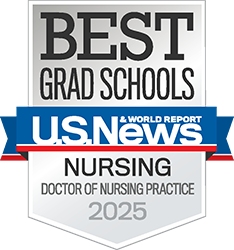Nutrition for pregnant women facing homelessness Galvin explores challenges with new grant

What happens to pregnant women who don’t know where their next meal will come from or where they will sleep at night?
Cizik School of Nursing at UTHealth Houston Assistant Professor Annalynn Galvin, PhD, RN, will use a $5,000 Dean’s Research Award to dig into this question, aiming to understand how housing instability affects nutrition for pregnant women. For her study, “Centering Community Voices in Understanding Perinatal Nutrition Among Recently Pregnant Women Experiencing Homelessness: A Mixed-Methods Study,” Galvin is recruiting 75 women in the Greater Houston area who have experienced homelessness during pregnancy for surveys and 30 for in-depth interviews.
“We know nutrition is essential during pregnancy, but for women experiencing homelessness, access to healthy food, guidance, and vitamins becomes even more challenging,” said Galvin, whose own upbringing in a low-income, multifamily household drives her research. “Our study aims to explore those unique barriers, from food availability in shelters to the lack of storage or restrictions on when they can eat, and begin identifying ways to support them better.”
The study is guided by a community advisory board made up of women with lived experience as well as health care and social service providers who serve them. This collaborative approach ensures the research is not only grounded in real-world insight but also shaped by the voices of those most directly affected.
Early findings paint a stark picture. Many participants understand the importance of healthy eating but are often at the mercy of what is available. Some shelters serve large, uniform meals with little consideration for dietary needs. Others limit when residents can eat, making it difficult for pregnant women to nourish themselves consistently. Access to prenatal vitamins, nutrition counseling, and safe food storage also remain major challenges.
“I faced the same challenges during my own pregnancy of figuring out what to eat and what to avoid,” Galvin said. “Even with my education and resources, it was challenging. I can’t imagine how overwhelming it must be for those dealing with unstable housing and limited support.”
The study also highlights how broader systemic issues, stress, health care access, and reproductive policy restrictions can further complicate a woman’s ability to prevent or plan for healthy future pregnancies.
By combining research with community insight, the team hopes the findings will inform the development of practical, culturally relevant interventions that address both nutritional and structural barriers for women experiencing homelessness during one of the most vulnerable times in their lives.
The project team includes co-investigators Dean Diane Santa Maria, DrPH, MSN, RN, ACRN, PHNA-BC, FSAHM, FAAN; Associate Professor Doncy Eapen, PhD, MSN, RN, FNP-BC; and Assistant Professor Hildreth Eloi, DNP, MSN-Ed, RNC-MNN from Cizik School of Nursing.
Merve Erten



